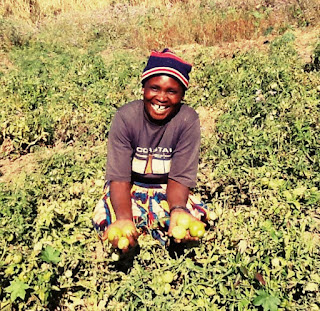Challenges facing the African Woman in Agriculture
Last week, on March 8th was the International Women’s Day and as the day was celebrated it hit my mind that women do have a crucial role in matters of agriculture and the environment. Agriculture contributes to 27% of Kenya’s GDP and within this sector women carry out most of the farm activities as men move to urban centres in search of employment opportunities. Women have faced a number of challenges with respect to this as highlighted below.
Women are poorly equipped for their role in the area of farming. Most of them are involved in subsistence farming and lack adequate access to production resources such as inputs, extension services and information. Women farmers have very little contact with extension services agents, denying them a possible source of information and encouragement to adapt to better technologies that are central to increased agricultural productivity and subsequent economic growth. Research has shown that female headed households do not attend most field days organized by agricultural extension officers due to involvement in other domestic duties.
Women are as good as men in development. Their productivity compares favourably with that of men when they receive equal opportunities. Additionally, women are good adapters of new technology therefore it is recommended that any enterprise that would like to prosper should equip both men and women equally.
Women have a low level of access to farm equipment as compared to men yet women are the ones more involved in farming than men. It would not be fair to expect a lot of outcome from women without marching their resources to that of men. For example land for farming is likely to be prepared late and in lesser acreage hence lower harvests due to inadequate equipment.
We also see that women own and control very small percentage of land. The same applies to the products of their labour where they have a lower control over. The title deed of the land is in most cases held by the man who will direct the use of the land hence the women’s user rights are greatly reduced.
Across Africa a woman’s day is longer than a man’s day. On average a woman days is almost 12 hours while a man’s is 8 hours, this is in respect to how active they are during the day. This overload on women can result in poor productivity from them and can affect their health in the long term.
Women in Africa are always in constant interaction with the environment especially in the rural areas as they collect essential items for their day to day lives. Such items include food, water, and firewood among others. It is very important that they are educated to conserve the environment so that it can be able to sustain them even in future days.
Women are poorly equipped for their role in the area of farming. Most of them are involved in subsistence farming and lack adequate access to production resources such as inputs, extension services and information. Women farmers have very little contact with extension services agents, denying them a possible source of information and encouragement to adapt to better technologies that are central to increased agricultural productivity and subsequent economic growth. Research has shown that female headed households do not attend most field days organized by agricultural extension officers due to involvement in other domestic duties.
Women are as good as men in development. Their productivity compares favourably with that of men when they receive equal opportunities. Additionally, women are good adapters of new technology therefore it is recommended that any enterprise that would like to prosper should equip both men and women equally.
Women have a low level of access to farm equipment as compared to men yet women are the ones more involved in farming than men. It would not be fair to expect a lot of outcome from women without marching their resources to that of men. For example land for farming is likely to be prepared late and in lesser acreage hence lower harvests due to inadequate equipment.
We also see that women own and control very small percentage of land. The same applies to the products of their labour where they have a lower control over. The title deed of the land is in most cases held by the man who will direct the use of the land hence the women’s user rights are greatly reduced.
Across Africa a woman’s day is longer than a man’s day. On average a woman days is almost 12 hours while a man’s is 8 hours, this is in respect to how active they are during the day. This overload on women can result in poor productivity from them and can affect their health in the long term.
Women in Africa are always in constant interaction with the environment especially in the rural areas as they collect essential items for their day to day lives. Such items include food, water, and firewood among others. It is very important that they are educated to conserve the environment so that it can be able to sustain them even in future days.



Comments
Post a Comment